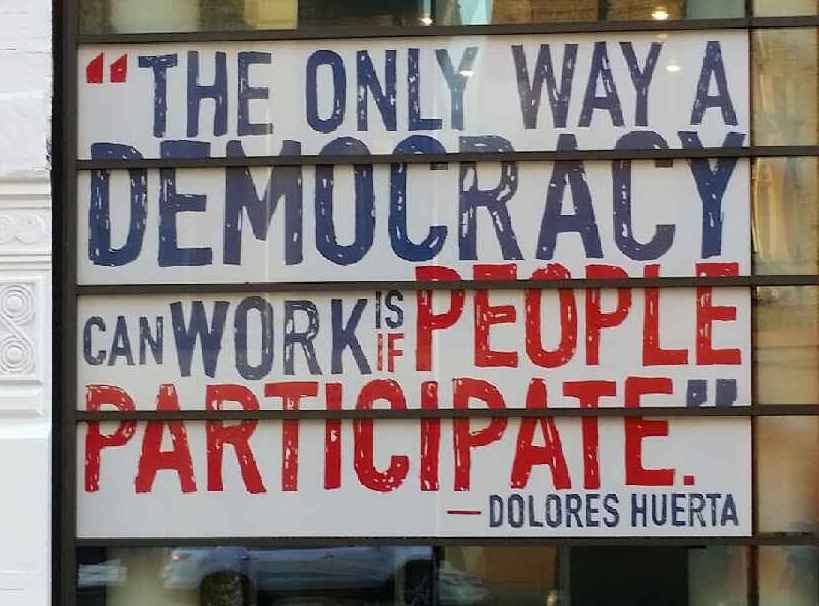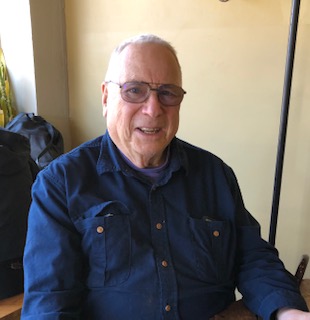Opinion: A Movement Voter Project For Amherst?

Photo: Sierra Club

If we survive this calamitous moment in United States history, we will face another one in Amherst, as the town gears up for a fall 2021 election in which all the seats on the Town Council, as well as other town bodies, will be on the ballot. I assume that many on the Council will run for re-election. I assume that Amherst Forward (AF) will be active in finding and supporting candidates who pledge to support its agenda. But those who oppose AF have to be clear about the central issue at stake, and it is not their agenda, whether or not one agrees with any or all of it.
The most important issue is the concentration of power in the Town Council, and the relative ease with which policy and action issues can be decided, first, by AF, the Political Action Committee (PAC) which, out of the public eye, decides on its agenda for Amherst, and, second, by Town Council candidates who have agreed to be subservient to its positions. I think we have to be pretty clear about this. For years AF and its predecessors have desired to have a controlling voice in town affairs. They have been patient, constructing coalitions of builders. developers, monied interests, and others distressed at the “school vote” and other sins they attributed (wrongly) to the institution of Town Meeting. They have been good at doing this, and they are getting close to where they want to be. They want a concentration of power, and they want to control it.
The efficacy of AF’s model is such that some who oppose them want to copy it. This is understandable. Power is the way to get things done. Concentrated power is the way to get things done quickly and efficiently, without having to worry about an opposition. But, as Lord Acton reminded us, “power tends to corrupt, and absolute power corrupts absolutely.” Absolute power is where we are heading in Amherst.
The new charter under which the Town is now operating makes this situation easy to sustain. It discourages participation of the public, it creates absurdities such as non-voting members of boards and committees, it allows Town Council members to serve on other public boards and committees that will bring proposals to the Council. It created fictive political entities called districts, which allow the possibility that certain areas of town will be represented by councilors who are not neighbors. The Town Council has taken onto itself the responsibilities formerly belonging to an independent Planning Board, and it has shown its true colors recently by removing from the now-impotent Planning Board an independent member.
So the issue before the Town next year is not the future of downtown or the future of the library but who decides these issues. Town activists who oppose AF may have varying positions on issues facing the town, but they correctly call themselves “independents.” So too can Councillors not endorsed by AF. Councillors supported by AF cannot legitimately call themselves independents. We need more independents on the Council and in the electorate.
Those of us who opposed the Charter lost for several reasons. We were out-organized, and out-spent. We operated more or less in the open while AF operated more or less in secret. But we really lost because of voter indifference, Large numbers of residents, including voters, are disengaged from town governance. This is a pretty longstanding tradition and it would be difficult to overcome.
But this is where our effort should be directed. We should not create a new PAC and thus lose the cherished label, independent. We need to find new ways to reach Amherst voters. We should, in reaching out, focus on the dangers of concentrating governance in the hands of an unchallengeable majority. Democracy is at risk in Amherst as it is in Washington.
The Movement Voter Project is a national organization with the main purpose of encouraging citizens to register and vote, particularly in underrepresented communities, communities of color, of the poor, or at risk. The Amherst Town Council may seem like small game compared to the momentous and horrifying direction our country is headed. But we need our own Movement Voter Project because such communities exist here and are our neighbors. We need a much larger turnout in November 2021, so that we can have confidence that the Town Council is truly representative of the voters.
To Amherst Forward I say: By all means endorse candidates, but not on the basis of binding them to your program. To other groups in town, please do the same thing. Seek to endorse candidates who reveal their vision of Amherst’s future openly and ask if they are willing to modify their views as they listen to voters who think otherwise.
To Town Councillors who wish to be re-elected I say: Indicate your independence of any organization that wishes you to pledge your vote to their positions. Be more respectful of residents by engaging with those who come to speak to you. Separate yourselves from the Planning Board, and on committees you appoint be sure there is a diversity of opinion as well as background.
To Town residents I say: If you are eligible to vote, be sure to register and to vote. Be an informed voter. Read the Amherst Bulletin and the Amherst Indy. Be sure to talk about the importance of separation of powers and checks and balances as well as the particular issues on the table with your neighbors and your children.
To all of us I say: Underneath the particular issues that engage our passions there is the fundamental issue of whether democracy can be sustained when concentration of power is increasingly the order of the day. This is true in Amherst as well as America. I don’t know the answer to this, but I do know that this is the question that should engage our passions and our acts. John Lewis was right when he said that democracy is an act, not a state. And Ruth Bader Ginsburg was right when she insisted on the power of dissent. We have heroes to guide us in these perilous times. Let us heed them in Amherst.
Michael Greenebaum was principal of Mark’s Meadow School from 1970-1991 and from 1974 taught Organization Studies in the Higher Education Center at the UMass School of Education. He served in Town Meeting from 1992, was on the first Charter Commission in 1993, and served on several town committees, including Town Commercial Relations Committee and the Long Range Planning Committee.



Michael, as usual, your analysis is “right on the money” as it were. Although I no longer live in Amherst (as I did for 36 years), I still follow events there with interest. I’m saddened, but not surprised, to see that many of the things that those of us who opposed the charter foresaw have come true.
Which brave, independent souls would be willing to campaign with the weight of a PAC against them? A PAC determined to replace at least one of the five independent Councilors who have served valiantly and cement their dominance by seeing that nine PAC candidates are elected? A movement voter project is not a bad idea, but who would they be turned out to vote for? Amherst Forward decided to form a PAC in order to provide financing and in-kind contributions to their slate of candidates so they would WIN. And they did. And will again in a year. That’s what elections are about: power.
To Rene Theberge – Thanks, Rene, and great to hear from you after many years!
To Christina Platt – While I understand your question to be largely rhetorical, it does point out an obvious if often overlooked point: whom we get to vote for depends upon who runs for office. So I want to say that I don’t share your pessimism. Both local and US history reveals countless people who run against great odds, and win or lose, the running itself is a vigorous contribution to democratic governance. And winning is not as impossible as you make it sound. Ben Herrington publicly repudiated AF support and won his School Committee seat (and they supported him anyway). Perhaps running against a PAC does require bravery, but we both know many brave people for whom running independently – not winning – would be the prize itself. And if their candidacy and views were more widely known and traditionally disengaged voters became excited about town government, who knows what might happen? You’re right – elections these days seem to be about power, but wouldn’t it be nice if in a place like Amherst they were also about ideas and competition between views of the future?